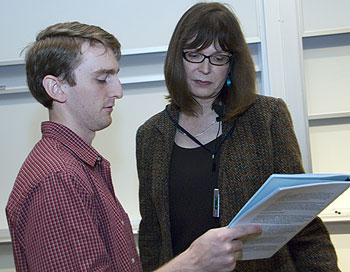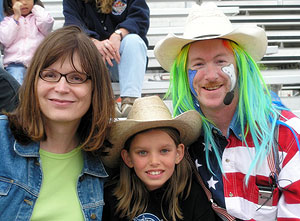Erika Crouch, M.D., Ph.D., professor of pathology and immunology, jokes that she “can’t get away from Washington.”
Crouch was born and grew up in Richland, Wash. She attended Washington State University and the University of Washington. When she came to St. Louis, she lived for a time in Washington Place. And, since 1983, she has been a faculty member at Washington University School of Medicine.

Looking back on close to a quarter-century at the University, Crouch has no regrets.
“In many jobs, if you stayed in one position for such a long time, you might feel like you were in a rut,” she says. “But medical faculty can do different things at different times. You can work in science, the clinical arena, in administration and teaching, so the blend constantly changes. And I’ve never been bored.”
Despite her love of a diverse career, there is one true crown among Crouch’s assorted hats: teaching. Since 1996, Crouch has been the coursemaster for the yearlong pathology course that all second-year medical students take.
“You constantly learn, you’re constantly asked questions you can’t answer, and it’s just very satisfying,” she says.
According to Crouch, the class she teaches is a pivotal one for students.
“This is where they begin to get into the heart of medicine,” she says. “Students get their first real introduction to all the things they came to school to study: how things go wrong at the level of a cell or a tissue or an organ, how that’s associated with the symptoms of disease and how that information can be used to predict the course of a disease.”
Because of the need to show students photos and other images of diseases and the processes that underlie the diseases, Crouch’s pathology course was among the first at the School of Medicine to make use of computer technology. Syllabi, readings, images and other information were made available online.
“I think having material online feeds into the idea that we want to give students alternative ways to learn,” Crouch says. “Not everyone learns the same way, so we want to provide different options for people with different learning styles.”
One of the course’s primary tasks, according to Crouch, is to ensure that students are comfortable with the language of disease. She asserts that familiarity with this language is essential if students are to keep up with new developments after they become established professionals.
“You can’t just take what you learn in medical school and move on,” she says. “The terminology students learn in second-year pathology provides much of the basis for investigating and talking about disease, and those tools are critical for lifelong learning.”
Crouch marvels not only at the way the medical curriculum has changed but also at the way years of teaching have changed her. She remembers being a quiet medical student and notes that pathology is “not the most people-oriented specialty.” Only after she started teaching did she develop a yearning for standing in front of large audiences and regularly interacting with more than 100 students.
“As much as I love science and taking part in patient care, I don’t think there’s any question that education is the thing that really gets me fired up,” she says. “And because I’m genuinely excited about it, it’s easier for students to come away feeling that what I’m teaching them is important and exciting.”

Her students have consistently affirmed this assessment. Crouch is a perennial winner of the School of Medicine’s Coursemaster of the Year Award and its Preclinical Teacher of the Year Award. In the past eight years, she has won the former award six times and the latter five times. She has also received two Distinguished Teaching Service Awards and the Alumni Board of Governors Distinguished Faculty Award.
“Dr. Crouch is a phenomenal instructor because she focuses on the knowledge and issues that we will actually need as clinicians,” says Yeamie Sheref, a third-year medical student. “As students, we all get the sense that she really cares about us and wants us to excel. To feel like your professor is on your side is a great feeling to have.”
Making a discovery
As a doctoral student, Crouch began studying a class of tissues known as the extracellular matrix — not actual cells, but materials secreted by cells that provide support to the cells.
In the late 1980s and early ’90s, Crouch was looking for new components of the lung’s extracellular matrix when her lab became the first to identify a molecule now known as surfactant protein D. She initially thought it was a collagen, a class of common connective proteins. But as she and other members of her lab took a closer look, some surprising features emerged. Through her research and that of others, scientists soon began to suspect that surfactant protein D might have important roles in fighting infection and regulating inflammation.
Crouch frequently collaborates on surfactant protein D studies with Kevan Hartshorn, M.D., professor of medicine at Boston University.
“Erika is the most brilliant, creative and generous scientist I’ve had the good fortune to collaborate with in my career,” Hartshorn says. “She has made original contributions to the understanding of host defense in the lung and always seems to be a step ahead in her understanding and her use of original techniques.”
Much of Crouch’s research now focuses on modifying components of surfactant protein D and testing how that affects the molecule’s properties.
“Scientists are interested in whether we could treat patients suffering from rapidly progressing infections with modified versions of surfactant protein D,” Crouch says. “But surfactant protein D has many different roles, and that means it’s going to take us a while to figure out how to safely use it for treatment.”
Making a home
Crouch remains very fond of Washington state and makes it back there as often as she can, but she says St. Louis has become her second home.
“It’s so easy to get where you want to go, and when you get there, it doesn’t cost you much to do it,” she says.
Crouch, a self-proclaimed “city person,” lives in a loft in the Dorris Motor Car Co. Building, a former factory in the Central West End that is listed on the National Register of Historic Places.
Crouch has served on the board of the building for several years and is active in the maintenance of its infrastructure.
|
Erika Crouch Family: Parents Clark and Barbara; brother Allan; daughter Leeza, 12 Born: July 17, 1950, in Richland, Wash. Favorite singer: Julio Iglesias Favorite eateries include: Chez Leon Favorite comfort food: Chicken soup at Little Saigon |
“The Dorris Co. was the first luxury car manufacturer west of the Mississippi, and it lasted up through the late 1920s,” she says. “My loft has lots of exposed pipes and other interesting architectural features.”
Crouch’s good friend and occasional research collaborator Linda Sandell, Ph.D., professor of orthopaedic surgery and of cell biology and physiology, praises both the loft and its decorator.
“She has great taste in art and such a beautiful contemporary condominium,” Sandell says. “She also hosts great dinner parties and has a very interesting collection of friends.”
“I like to cook, but I don’t really have a specialty,” Crouch says. “When I have guests over, I’ll usually go out and look for something interesting to cook and experiment on my guests. I warn them ahead of time of this,” she adds with a laugh.
Crouch engages in a wide variety of pastimes, including shopping and the arts, likes several genres of music and types of ethnic cuisine and occasionally plays the guitar.
She will admit to one regular pastime: Every morning, Crouch gets up early and watches the sun rise over the Gateway Arch from a window in her loft.
“I haven’t always had an easy life, but right now I’ve kind of found my way, and I’m very happy,” she says. “I like feeling happy and being around family and good friends.”